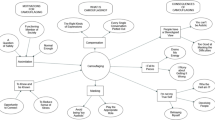Abstract
A cognitive-behavioral treatment program for aggressive children was assessed using 12 outcome measures classified into five categories which reflected a continuum of generalization of treatment effects. From a summer daycamp 41 children, ages 7 through 12, were selected based on aggressive behavior displayed during the first week of camp. They were randomly assigned to either a treatment group or a nontreatment control group. Treatment consisted of four weeks of coping-skills training using behavioral rehearsal and self-instruction training. Considering all 12 measures, treatment was found effective (F=2.90, p < .01). The most meaningful results included improved interpersonal problem-solving skills and a decrease in being disciplined for fighting. No changes were found, however, in physical or verbal aggression and in peer rating of aggression. Modest support for the effectiveness of these treatment procedures was identified, although caution is needed in considering their clinical utility. Further research and application appear justified.
Similar content being viewed by others
References
Bandura, A.Aggression: a social learning analysis. Englewood Cliffs, New Jersey: Prentice-Hall, 1973.
Bem, S. Verbal self-control: The establishment of effective self-instruction.Journal of Experimental Psychology, 1967,74, 485–491.
Camp, B. W. Verbal mediation in young aggressive boys.Journal of Abnormal Psychology, 1977,86, 145–153.
Camp, B. W., Blom, G. E., Hebert, F., & van Doorninck, W. J. “Think aloud”: A program for developing self-control in young aggressive boys.Journal of Abnormal Child Psychology, 1977,5, 157–169.
D'Zurilla, T., & Goldfried, M. Problem solving and behavior modification.Journal of Abnormal Psychology, 1971,78, 107–129.
Eron, L. D., Leopold, O. W., & Monroe, M. L.Learning of aggression in children. Boston: Little, Brown & Co., 1971.
Finch, A., Wilkinson, M., Nelson, W., & Montgomery, L. Modification of an impulsive cognitive tempo in emotionally disturbed boys.Journal of Abnormal Child Psychology, 1975,3, 45–52.
Ganzer, V. J. The use of modeling techniques in rehabilitation of the juvenile offender. In J. G. Cull & R. E. Hardy (Ed.),Behavior modification in rehabilitation settings. Springfield, Illinois: Charles C Thomas, 1974.
Gittelman, M. Behavior rehearsal as a technique in child treatment.Journal of Child Psychology and Psychiatry, 1965,6, 251–255.
Goodwin, S. E., & Mahoney, M. J. Modification of aggression through modeling: An experimental probe.Journal of Behavior Therapy and Experimental Psychiatry, 1975,6, 200–202.
Hartig, M., & Kanfer, F. The role of verbal self-instruction in children's resistance to temptation.Journal of Personality and Social Psychology, 1973,25, 259–267.
Hobbs, S. A., Mogvin, L. E., Tyroler, M., & Lahey, B. B. Cognitive behavior therapy with children: Has clinical utility been demonstrated?Psychological Bulletin, 1980,87, 147–165.
Kirschner, N., & Levine, L. A direct school intervention program for the modification of aggressive behavior.Psychology in the Schools, 1975,12, 202–208.
Kohlberg, L., LaCrosse, J., & Ricks, D. The predictability of adult mental health from childhood behavior. In B. B. Wolman (Ed.),Manual of child psychology. New York: McGraw-Hill, 1972.
Levitt, E. E. Research on psychotherapy with children. In A. E. Bergin and S. L. Garfield (Eds.),Handbook of psychotherapy and behavior change. New York: Wiley, 1971.
Mahoney, M. J. Reflections on the cognitive-learning trend in psychotherapy.American Psychologist, 1977,32, 5–13.
Meichenbaum, D. H., & Goodman J. Training impulsive children to talk to themselves: A means of developing self control.Journal of Abnormal Psychology, 1971,77, 115–126.
Miller, L. C. School behavior checklist: An inventory of deviant behavior for elementary school children.Journal of Consulting and Clinical Psychology, 1972,38, 134–144.
Navaco, R. W.Anger control: The development and evaluation of an experimental treatment.Lexington, Massachusetts: Lexington Books, 1975.
Olweus, D. Stability of aggressive reaction patterns in males: A review.Psychology Bulletin, 1979,86, 852–872.
Palkes, H., Stewart, M., & Kahana, B. Porteus Maze performance of hyperactive boys after training in self-directed verbal commands.Child Development, 1968,39, 817–826.
Patterson, G. R., Cobb, J. A., & Ray, R. S. A social engineering technology for retraining the families of aggressive boys. In H. E. Adams & I. P. Unikel (Eds.),Issues and trends in behavior therapy. Springfield, Illinois: Charles C Thomas, 1973.
Robins, L. N.Deviant children grown up. Baltimore: Williams & Wilkins, 1966.
Robins, L. N. Antisocial behavior disturbances of childhood: Prevalence, prognosis, prospects. In E. J. Anthony, & C. Koupernick (Ed.),The child in his family, Vol. 3,Children at psychiatric risk. New York: Wiley, 1974.
Sarason, I. G., & Ganzer, V. J. Developing appropriate social behaviors of juvenile delinquents. In J. Krumboltz & C. Thoresen (Eds.),Behavioral counseling: Cases and techniques. New York: Holt, Rinehart & Winston, 1969.
Shure, M., & Spivack, G. Means-ends thinking, adjustment and social class among elementary school-aged children.Journal of Consulting and Clinical Psychology, 1972,38, 348–353.
Spivack, G., & Shure, M.Social adjustment of young children: A cognitive approach to solving real-life problems. San Francisco: Jossey-Bass, 1974.
Urbain, E. S., & Kendall, P. C. Review of social-cognitive problem-solving interventions with children.Psychological Bulletin, 1980,88, 109–143.
Weissberg, R. P., Gesten, E. L., Rapkin, B. D., Cowen, E. L., Davidson, E., de Apodaca, R. F., & McKim, B. J. Evaluation of a social-problem-solving training program for surburban and inner-city third-grade children.Journal of Consulting and Clinical Psychology, 1981,49, 251–261.
Author information
Authors and Affiliations
Rights and permissions
About this article
Cite this article
Kettlewell, P.W., Kausch, D.F. The generalization of the effects of a cognitive-behavioral treatment program for aggressive children. J Abnorm Child Psychol 11, 101–114 (1983). https://doi.org/10.1007/BF00912181
Revised:
Issue Date:
DOI: https://doi.org/10.1007/BF00912181




